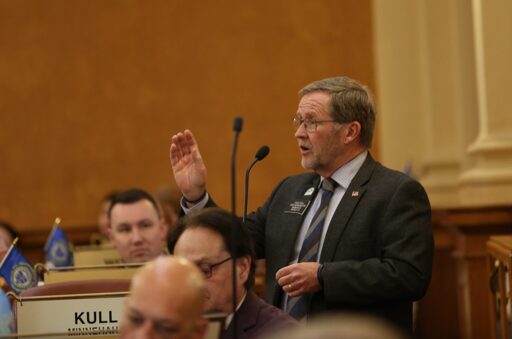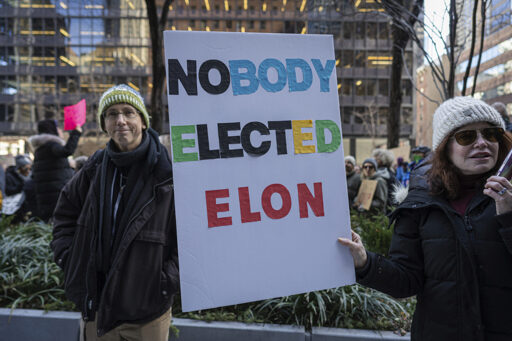- 6 Posts
- 17 Comments

 10·1 day ago
10·1 day agoKeep calling, don’t let up

 31·1 day ago
31·1 day ago* enforcement of laws
The laws themselves have not changed. Violations today could still be later enforced by a future administration

 7·1 day ago
7·1 day agoChanged OK to Oklahoma in the title now

 39·1 day ago
39·1 day agoThis is a sign that Trump to some degree fears blowback. He wouldn’t make statements like this if he thought there was no threats to his power. He wants you to think he’s already obtained 100% power so you don’t fight fight back

 132·1 day ago
132·1 day agoI don’t understand how they’re getting that out of this statement. His statement says it’s on Republicans to work with Dems to avoid a shutdown?
Legislation: As you know, the FY25 Continuing Resolution expires on March 14, 2025–less than 5 weeks away. Senate Democrats are fully supportive of efforts by our Vice Chair, Senator Patty Murray to secure a topline Appropriations deal – the way the process is meant to function. Unfortunately, Leader Thune seems to have already abandoned regular order forthe appropriations process, instead choosing to focus solely on confirming the Trump nominees and pushing through the radical Republican reconciliation plan. Democrats stand ready to support legislation that will prevent a government shutdown. Congressional Republicans, despite their bluster, know full well that governing requires bipartisan negotiation and cooperation. Of course, legislation in the Senate requires 60 votes and Senate Democrats will use our votes to help steady the ship for the American people in these turbulent times. It is incumbent on responsible Republicans to get serious and work in a bipartisan fashion to avoid a Trump Shutdown.

 13·2 days ago
13·2 days agoThings like this fail all the time, it just always get 10x less press than something like this being proposed. There is always a fight even if it’s not televised
They want you to believe they already have much more control than they do so you’ll comply in advance to things they actually wouldn’t have been able to force you to do. They want you to think they are unstoppable, but they get stopped all the time. They get slowed down even more often which matters a lot more than you think
By courts, which they are largely still complying with at the moment. By various workers within government standing up. By local and state governments who are fighting back and passing laws to make their actions more difficult, etc.

 3·2 days ago
3·2 days agoI am not sure I follow what you’re asking? Where do you see “EED”?

 14·2 days ago
14·2 days agoStill slows down some of their other goals. Attention and resources aren’t infinite. The more they wear themselves thin on things that don’t matter / have less bad outcomes, the better

 3·4 days ago
3·4 days agoWe can look at individual foods themselves
To produce 1 kg of protein from kidney beans required approximately eighteen times less land, ten times less water, nine times less fuel, twelve times less fertilizer and ten times less pesticide in comparison to producing 1 kg of protein from beef
https://pubmed.ncbi.nlm.nih.gov/25374332/
We can look at other modeling studies. Here’s a review of modeling studies
Our review showed that reductions above 70% of GHG emissions and land use, and 50% of water use, could be achieved by shifting typical Western diets to more environmentally sustainable dietary patterns. Medians of these impacts across all studies [Including studies with just partial changes in consumption] suggest possible reductions of between 20–30%.
https://journals.plos.org/plosone/article?id=10.1371%2Fjournal.pone.0165797&emulatemode=2
We can also look at some specific modeling studies in specific countries. Numbers will slightly different from global picture since it is going to vary based on how much animal products are consumed there
For instance, here’s one looking at France in particular
Vegans’ diet emitted 78% less GHG, required 53% less energy and 67% less land occupation than omnivorous’ diet. These results are in line with several recent works documenting associations between dietary patterns and a set of environmental impacts (GHG emissions, land occupation, and water use) in modelled and observed data (8,10,20)
https://www.sciencedirect.com/science/article/abs/pii/S2352550919304920
Here’s another study modeling for Romania in particular (though does indirectly use some from numbers from Poore, Nemecek). Romania consumes roughly half per capita as somewhere like the US and still sees quite high reductions with removing all animal products
With the reduction of 100% [of animal products in diets], the largest decrease is observed, equaling a total of 11,131,127 ha, reducing land use by 733,898 ha compared to the 50% scenario and by a total of 1,067,443 ha compared to the baseline. This represents almost the cumulative UAA of two large-sized counties in Romania, Arad and Timis

 3·4 days ago
3·4 days agoThis is not a problem of exports. The US eats way animal products more per capita. If everyone ate like Americans, we would need 137% of the world’s habitable land which includes forests, urban areas, arable and non-arable land, etc. Cutting down every forest wouldn’t even be enough
The land usage itself isn’t free either. It comes with costs
Livestock farmers often claim that their grazing systems “mimic nature”. If so, the mimicry is a crude caricature. A review of evidence from over 100 studies found that when livestock are removed from the land, the abundance and diversity of almost all groups of wild animals increases
And that’s not to mention the emissions which are enough to make us miss climate targets on their own if we ignore them. We must address fossil fuels and animal agriculture
To have any hope of meeting the central goal of the Paris Agreement, which is to limit global warming to 2°C or less, our carbon emissions must be reduced considerably, including those coming from agriculture. Clark et al. show that even if fossil fuel emissions were eliminated immediately, emissions from the global food system alone would make it impossible to limit warming to 1.5°C and difficult even to realize the 2°C target. Thus, major changes in how food is produced are needed if we want to meet the goals of the Paris Agreement.
(emphasis mine)

 1·4 days ago
1·4 days agoA supply chain management system is not the strong protection you might think it is. Factory farming has continued to consolidate with it in place. Especially with it being something that most all egg farms are not involved in to begin with
The number of chicken farms has declined 88 percent; while in the same period of time in the United States, the number of dairy farms dropped by 88 percent.[34][3] Supply-managed farms represent 8% to 13% of all farms in the country.[194]
[…]
Hall Findlay says that even with supply management, "[t]here has been more consolidation in dairy, poultry and eggs than in almost every other agricultural sector
https://en.wikipedia.org/wiki/Dairy_and_poultry_supply_management_in_Canada#Policy

 21·4 days ago
21·4 days agoThe article also doesn’t say they couldn’t or wouldn’t intensify operations any further. They talk about the state today, not down the line in the future
Going back to the original article’s idea, People demaning lower prices tends to put pressure on them to do so whenever prices rise for any reason. Regardless of being diseases related
See also the UK who’s historically claimed how they do things differently and now has over 1000 megafarms

 21·4 days ago
21·4 days agoAnd much of the world is heading that way - not away from it. Think of it only a US problem at your own peril

 2·4 days ago
2·4 days agoThis is not some trivial difference. I talk about efficiency because we’re talking about substantial portions of entire global resources. The difference is many order of magnitudes between any animal products and plants. It’s enough to change the entire environment of our planet
I think that deserves far more weight than “culture”. Because something is tradition is no good reason to keep doing something
Research suggests that if everyone shifted to a plant-based diet, we would reduce global land use for agriculture by 75%. This large reduction of agricultural land use would be possible thanks to a reduction in land used for grazing and a smaller need for land to grow crops.
https://ourworldindata.org/land-use-diets
And that land for instance can come from places like the Amazon rainforest
Extensive cattle ranching is the number one culprit of deforestation in virtually every Amazon country, and it accounts for 80% of current deforestation

 6·4 days ago
6·4 days agoAt the cost of still having the factory farming the original article talks about. Animal agriculture’s many problems are often worse in the US but don’t pretend they don’t exist elsewhere
Canada, however, remains the Western leader in hen confinement, with 83 percent of egg-laying hens still confined to battery cages as of last year [2021] – 27 percent in enriched cages, according to Mercy.
https://sentientmedia.org/enriched-versus-cage-free-eggs/
[In 2024] over 81% of Canada’s hens remain in “enriched” cages, which offer minimal improvements over traditional battery cages, restricting natural behaviours like wing flapping, perching, and dust bathing.

 1·4 days ago
1·4 days agoExpectations that it should be cheap drive up that consumption. Per capita consumption has gone up. It fundamentally can’t work at mass consumption and production levels we see today
The process of producing animal products is inherently quite inefficient. It takes quite a lot of feed to do so at scale and you lose a lot of that energy
That’s going to always push you towards factory farming at scale because it’s horrifying but more efficient resource wise (still many magnitudes less efficent than eating plants directly)
For some examples, lets look at something like beef production. Your best case you would think of is probably something like only grass-fed production. But there isn’t enough land to support anything close to current consumption
we find that a nationwide shift to exclusively grass-fed beef would require increasing the national cattle herd from 77 to 100 million cattle, an increase of 30%. We also find that the current pastureland grass resource can support only 27% of the current beef supply (27 million cattle), an amount 30% smaller than prior estimates






Reminder that they want to project more strength than they actually have. They are not invincible, they can be successfully challenged. They want you to think they have 100% power so that you capitulate on things they couldn’t actually have made you do. Don’t give in - fight back